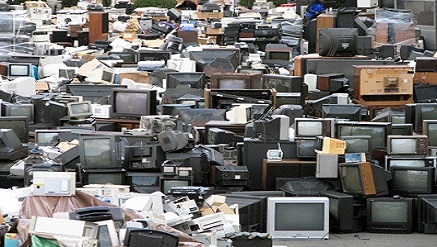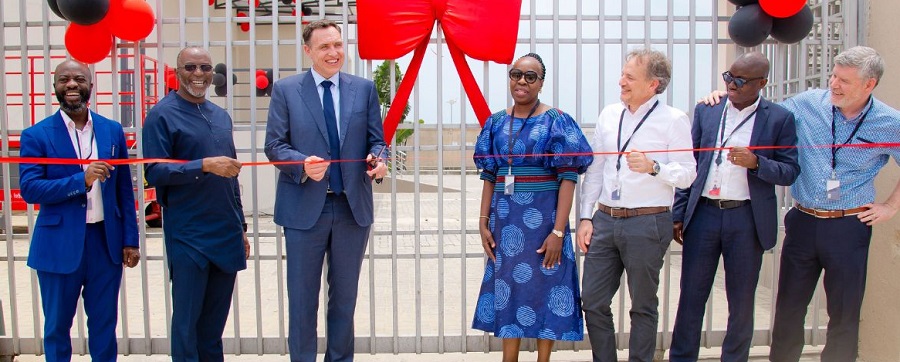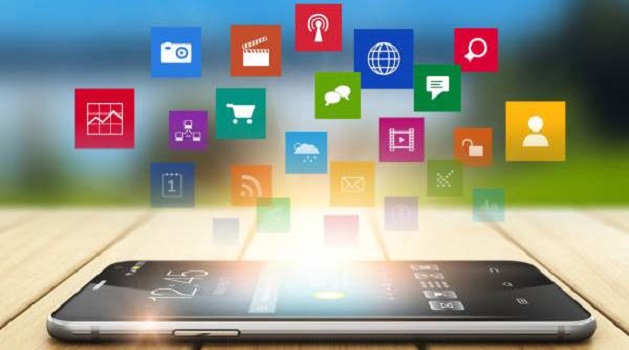E-Business
eWaste: Africa Generates 1.7 kg/inh Least of Global- Study

The global quantity of e-waste generation in 2014 was around 41.8 million tonnes according to United Nations University’s Institute for the Advanced Study of Sustainability study.
United Nations University (UNU) is an autonomous organ of the UN General Assembly dedicated to generating and transferring knowledge and strengthening capacities relevant to global issues of human security, development, and welfare.
The University operates through a worldwide network of research and training centres and programmes, coordinated by UNU Centre in Tokyo.
Co-authored by Kees balde, Feng wang, Jaco Huisman, Ruediger Kuehr, jennifer wong and representatives of United Nations University’s Institute for the Advanced Study of Sustainability, the study revealed that in 2014 shows that approximately and only 4 Billion people are covered by national legislations.
That’s approximately four out of every seven people; though legislation does not necessarily come together with enforcement and the lowest amount of e-waste per inhabitant of e-waste was generated in Africa, where only 1.7 kg/inh generated in 2014.
Total E-waste Per Category in 2014
The global quantity of e-waste in 2014 is comprised of 1.0 Mt lamps, 3.0 Mt of Small IT, 6.3 Mt of screens and monitors, 7.0 Mt of temperature exchange equipment (cooling and freezing equipment), 11.8 Mt large equipment, and 12.8 Mt of small equipment. The amount of e-waste is expected to grow to 49.8 Mt in 2018, with an annual growth rate of 4 to 5 per cent.
E-Waste Generation Per Category, Continent And Per Inhabitant
Most of the e-waste was generated in Asia: 16 Mt in 2014. This was 3.7 kg for each inhabitant. The highest per inhabitant e-waste quantity (15.6 kg/inh.) was generated in Europe.
The whole region (including Russia) generated 11.6 Mt. The lowest quantity of e-waste was generated in Oceania, and was 0.6 Mt. However, the per inhabitant amount was nearly as high as Europe’s (15.2 kg/inh.).
The lowest amount of e-waste per inhabitant was generated in Africa, where only 1.7 kg/inh. was generated in 2014. The whole continent generated 1.9 Mt of e-waste.
The Americas generated 11.7 Mt of e-waste (7.9 Mt for North America, 1.1 Mt for Central America, and 2.7 Mt for South America), which represented 12.2 kg/inh.
Specifically, available records indicate that an estimated 0.1 Mt of e-waste was imported into Nigeria in 2010 and another 0.1 Mt of second hand (repairable) equipment was imported into Nigeria in 2012).
In this scenario, e-waste is usually collected by self-employed peddlers, who usually buy e-waste from consumers, while imported equipment can be used in households, or sent straight to scrap-yards Imports of hazardous waste have to comply with the Basel Convention, as evident at Otiga and computer village in Lagos.
On Regional Details Of E-Waste Management, the study suggests that in Africa, the total e-waste generation was 1.9 Mt in 2014.
Meanwhile, only Cameroon and Nigeria have enforced national e-waste related legislation, while Ghana, Ethiopia and Kenya still have legislation pending approval.
The top three African countries with the highest e-waste generation in absolute quantities are Egypt (0.37 Mt), South Africa (0.35 Mt) and Nigeria (0.22 Mt).
The top three African countries with the highest e-waste generation in relative quantities are Equatorial Guinea (10.8 kg/inh.), Seychelles (10.9 kg/inh.) and Mauritius (9.3 kg/inh.).
In contrast with these relatively wealthy countries, the whole continent only generates 1.7 kg/inh. of e-waste domestically (excluding imports) annually.
The study reports that “Very few official government reports are available on e-waste management in Africa. On the continent, the e-waste challenge is on the political agenda the past couple of years, but there is generally a lack of e-waste management infrastructure, which is reflected by the absence of e-waste management laws.
“Africa, particularly the western Africa, becomes the dumping destination for e-waste from various regions of the world. This is because the East and Southern African regions have gradually put measures to prevent the dumping of e-waste, and it started to take effect. Illegal import of e-waste or used electronics from all over the world is a major source of e-waste in countries like Ghana and Nigeria.
“This is driven by the demand of inexpensive EEE and secondary materials, as well as cheap dumping prices compared to the treatment with stricter standards in the export countries. The recycling activities of e-waste in Africa are usually carried out on an informal basis, often involving open burning in unmonitored dumpsites or landfills”.
“This rudimentary recycling has caused substantial damage to the health of scavengers and local environment. If properly regulated and managed, recycling of e-waste can help to develop local economies and reduce poverty,” the study recommended.
E-Business
Equinix Launches LG2.3 Data Centre in Nigeria

Equinix, global digital infrastructure company, has launched a cutting-edge LG2.3 data centre in Lagos aimed at fueling Nigeria’s booming tech scene.

Equinix officials at the launch
The data centre is designed to provide businesses with secure, reliable, and high-performance colocation and interconnection services, crucial for supporting the increasing demand for digital services across the region.
Nestled in the bustling Lekki Free Zone, LG2.3 is packed with the latest tech, offering businesses the secure and lightning-fast connections they crave. Think of it as the engine room for Nigeria’s online world, designed to handle the explosive growth of digital services.
The launch featured Bruce Owen, president, Equinix’s EMEA, who cut the ribbon to open the data centre.
“Nigeria is our focus,” Owen declared, emphasizing Equinix’s dedication to powering the nation’s digital growth. “The energy here is incredible, and we’re excited to be part of it.”
On his part, Wole Abu, managing director, Equinix’s West Africa, echoed this sentiment highlighting the increasing global demand for digital infrastructure.
“Africa is on the cusp of a digital explosion, and we’re here to support that growth,” he said.
Nigeria’s digital adoption is skyrocketing, driven by a young, tech-savvy population. Businesses are racing to embrace online platforms, and LG2.3 is perfectly positioned to meet their needs.
This investment is set to create a ripple effect, boosting the economy, creating jobs, and fostering innovation.
LG2.3 is set to be a beacon for Africa’s tech potential.
Equinix’s confidence in the continent aims to attract more global players, turning Africa into a digital powerhouse.
This data centre will act as a vital connection hub, empowering businesses to connect and collaborate, bridging the digital divide.
Equinix’s vision extends beyond Nigeria, with plans to expand across Africa.
strategic move reflects their commitment to building a connected and thriving digital ecosystem.
The success of LG2.3 is a testament to the power of public-private partnerships, with the Nigerian government playing a crucial role in attracting investment.
As Nigeria marches towards a digital future, Equinix’s LG2.3 data centre will be a key driver of progress. It’s a powerful symbol of Nigeria’s digital ambition and a catalyst for Africa’s tech revolution.
E-Business
Microsoft Marks 50th Anniversary with Major Copilot AI Update

Microsoft is celebrating its 50th anniversary with a major leap forward into artificial intelligence, unveiling significant updates to its AI assistant, Copilot.

The announcement was made on April 4, 2025, at the company’s headquarters in Redmond, Washington, marking a milestone for both Microsoft and the AI industry.
As the tech giant celebrates its golden anniversary, the company is setting its sights firmly on the future, particularly with its AI-driven tools.
Microsoft’s Copilot, which has been integrated into various software tools across its ecosystem, has now received a significant upgrade.
The new features aim to make the Copilot assistant more intelligent, personalised, and proactive, which positions Microsoft as a serious competitor in the AI space against other industry leaders such as OpenAI’s ChatGPT and Anthropic’s Claude.
Mustafa Suleyman, head of Microsoft’s AI division, expressed the company’s ambition, saying, “We envision Copilot not just as an assistant, but as a long-term AI companion, one that can learn, adapt, and evolve alongside its users. This goes beyond just responding to commands; it’s about fostering relationships between users and their AI.”
The most notable update to Copilot is its new memory functionality. Now, the assistant can retain information such as preferences, previously used commands, and even personal context, making it more responsive and efficient in future interactions.
This means Copilot can, for example, anticipate a user’s needs based on past behaviours, from scheduling meetings to suggesting restaurants for a night out.
In addition to the memory features, Copilot’s new “Vision” capabilities extend the AI’s functionality across multiple platforms. Windows and mobile users will now be able to interact with Copilot using both the camera and on-screen elements.
This includes actions such as booking appointments, managing tasks, and even shopping online — all in a more interactive and seamless way.
Scott Guthrie, Microsoft’s Executive Vice President, shared his enthusiasm about the potential of these advancements, stating, “With these new capabilities, we’re not just reacting to AI’s capabilities — we’re shaping the future of how users interact with technology. AI can do so much more than just assist with tasks. It can enrich the human experience.”
The updated Copilot is designed to challenge industry competitors like ChatGPT and Claude, offering more personalised and context-aware interactions.
Microsoft has positioned its Copilot as a tool that not only assists users but builds a deeper, more intuitive relationship over time.
The company has also placed a strong emphasis on AI accessibility. With AI’s growing role in everyday tasks, Microsoft aims to make it easier for users to adopt and benefit from these technologies, regardless of their technological proficiency.
Despite past challenges, including legal disputes over privacy and AI ethics, Microsoft continues to push boundaries in the AI space. Guthrie remarked, “This is just the beginning. As we continue to innovate, we are reshaping how people work, interact, and live with technology.”
With Copilot’s advancements, the tech giant hopes to continue its legacy of innovation, making AI tools accessible and useful for people around the world.
E-Business
Report Suggests a Slash in Mobile App Usage By 2027 Due to AI Assistants

By 2027 mobile app usage will decrease by 25 per cent due to AI assistants according to Gartner, Inc. Smartphone users will turn to AI assistants, such as Apple Intelligence, ChatGPT, Google Gemini, Meta AI, and others to replace apps for many functions.

In addition to the impact of AI assistants, apps will be consolidated across separate brands and companies, creating mobile app partnerships or consortiums to reach more users per app at scale and defray the cost of creation and maintenance.
“CMOs should begin scenario planning for the impacts of decreased mobile app usage,” said Emily Weiss, Senior Principal for the Gartner Marketing Practice.
“Brands with low app engagement and retention will likely be first impacted – this will be a positive development for brands that are not overly reliant on driving revenue via apps as app development costs will decrease.
Other brands may be severely impacted by the disintermediation of users turning to AI assistants for services. The loss of app users will also result in the loss of first-party data collection and the ability to reach fewer users via mobile push notifications,” Emily added.
By 2026, Over 1/3 of Web Content will be Created for the Purposes of Gen-AI Powered Search According to Gartner’s 2024 CMO Spend Survey of 395 respondents between February and March 2024, the average CMO allocated almost a quarter of their digital marketing budget to search.
Other than end users directly visiting a website, search currently drives more traffic to the average commercial enterprise website than any other referral source.
Given this, a loss of search driven traffic due to algorithmic shifts by major search engines would result in tangible, negative commercial impact to any organisation.
“CMOs will need to direct their teams to hire talent with a strong understanding of how GenAI, and broader AI influences, impacts the performance of their content in search algorithms,” said Weiss.
“It will be important to upskill the function by investing in search and content talent with AI skillsets. These associates will need to have familiarity with creating or optimising content to train and rank within evolving search algorithms,” she said.
By 2028 digital Mlmarketers will move 30 per cent of their paid social budget to support advertising and partnerships on subscription-based channels It is becoming more challenging for CMOs to maintain, let alone grow, their reach and engagement among consumers.
This is especially true as consumers shift their tech and media behaviors away from social media, to other platforms and subscription based channels.
Gartner’s 2024 CMO Spend survey found that since 2022, paid social has maintained the highest budget allocation for all digital media spend. In 2024, B2C Marketing leaders reported allocating 14.3 per cent for their digital channel budget to social media advertising (an increase from 12.3% in 2023).
“Closed group communities and subscription channels of – fer a potential alternative for social media weary consumers and content creators who want to do more than feed the algorithm,” said Weiss.
“Brands can leverage closedgroup subscription channels – such as Substack, Patreon, and Discord – and the professional creators on them to reach relevant target audiences who are already engaging with content they self-selected into consuming,” she added.
Current AI models, such as large language models (LLMs), lack the agency to autonomously execute tasks and adapt in complex environments.
However, as new levels of intelligence are added, new AI agents are poised to quickly become more capable and reliable as brands seek to address customer facing use cases.
“There will be more AI agents than people, so while current approaches require humans in the loop, this idea will quickly become antiquated.
Marketers will need to determine when and how they can trust AI agents to act on behalf of the brand and customers across key areas,” said Weiss.

 General News2 days ago
General News2 days agoAirbnb Community Fund Donates ₦13 Billion to Nonprofits Worldwide

 General News2 days ago
General News2 days agoNigerian Military Makes History with Africa’s First Attack Drones, Bombs

 News2 days ago
News2 days agoShell, Renaissance Face Legal Action over SPDC Licence Transfer

 E-Business2 days ago
E-Business2 days agoKike, Nigerian Tech Firm Launches ‘Kike AI’ for Kitchen Innovation

 Telecom2 days ago
Telecom2 days agoNigeria Heads Anglophone Data Protection Committee

 E-Financial2 days ago
E-Financial2 days agoSterling Bank Makes Online Transfer Charges Free of Charge

 News2 days ago
News2 days agoWorld Bank Approves $1.08Bn Loan for Nigeria

 Telecom2 days ago
Telecom2 days agoHow MIP Is Making a Difference in The Media Landscape















